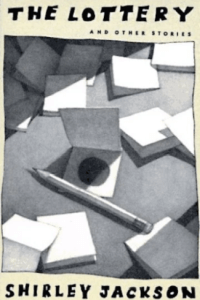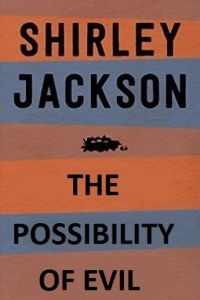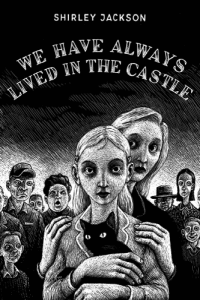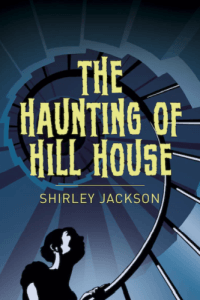What truly terrifies us is what lies within the recesses of our own imagination. It’s the anticipation, and nobody knew this better than Shirley Jackson.
So here I’ll look at her most terrifying moments. Some choices may be more telling of my own past (having grown up in a small town, this being a recurring theme of hers). But, generally, the fears she tapped into are universal and timeless. Jackson was great at striking a chord in realistic social horror.
Also, spoilers beware, so make sure to read all her work from start to finish if you haven’t already. Trust me, it’s for the best.
The final reveal of the villager’s annual ritual – The Lottery (1948)
 View on Amazon.com
View on Amazon.com
One of Jackson’s best-known stories, and probably one of the best know shorts in American literature. A ‘chilling tale of conformity gone mad’ (there really is a Simpson’s reference for everything), it’s a powerful snapshot of small-town America breaking down.
After its release in The New Yorker, Shirley Jackson received a deluge of hate mail. Apparently its contents were ‘too violent’ for readers, but it’s also likely that the underlying themes struck a nerve for the time. We don’t like to be reminded of our susceptibility to mob mentality it would seem. And this rural snapshot reflected what we’re all capable of with its blunt and brutal ending.
Who’s sending the letters? – The Possibility of Evil (1965)
 View on Amazon.com
View on Amazon.com
Again, this is another short story that peeks under the small-town hood of rural America to find something dark and ugly. Wearing a mask to the world, Miss. Strangeworth is a character we all know. An elderly busybody at the center of the community, she’s up in everyone’s business from the get-go. But nobody complains because that’s just Miss. Strangeworth. She’s always been there.
Then it’s revealed what she’s up to behind her perfectly pruned roses, sending out anonymous letters and stirring up trouble. Does she believe she’s doing good or is she just plain malicious? In short; is there a possibility of evil?
The walls are closing in – We Have Always Lived in the Castle (1962)
 View on Amazon.com
View on Amazon.com
Another timeless response to the stifling social climate of the 1950s, this novel by Jackson captures mob hysteria. Like The Lottery, it encapsulates the potential brutality of society and how it fears the other.
Then there’s the general feeling of unease and claustrophobia suffocating them. The walls of the Blackwood family manor seem to close in around Merricat and her sister Constance, as they isolate themselves from the world. Under constant suspicion from the locals, they hide behind the decaying walls. As the reader, you’re cut off with them, pinned between the pages.
Jackson was a true master of atmosphere, and this chiller is no exception.
‘God! God! Whose hand was I holding?’ – The Haunting of Hill House (1959)
 View on Amazon.com
View on Amazon.com
So many horror films today rely on jump scares, which you can trace back to Hill House. But the trick here is in how it also relies on the imagination of the reader, and not falling back on easy frights.
Plus it’s an excellent character study to boot.
The sentence itself is succinct yet says so much, ‘God! Whose hand was I holding?’ Reaching out to Theodora in the middle of the night, Eleanora holds on tight to what she thinks is her hand. The lights then come on to reveal Theo’s across the other side of the room.
Whose hand was she holding indeed?
‘Nobody ever stayed at the lake past Labor Day before’ – The Summer People (1950)
 View on Amazon.com
View on Amazon.com
Again it’s a story set within a small community. This time round it’s a case of the townsfolk being less than welcoming after tourist season’s up.
Heading into the country for their annual trip, a New York husband and wife vacation at a lake cottage. With the town people going out of their way to accommodate the couple’s every whim during their stay, local hospitality soon runs dry once Labor Day comes around. Wanting to stay on this year, they’re both met with disapproving looks, as they’re told ‘nobody’s stayed at the lake past Labor Day before…’ Is it a threat? What’s going to happen?
It’s creepy in that you can’t quite make out the danger, but you know it’s there. That and the couple are so frustratingly oblivious. There’s an eerie air of normalcy until there’s not.
A most brutal bludgeoning – The Road Through the Wall (1948)
 View on Amazon.com
View on Amazon.com
If The Lottery showed us anything it’s that Shirley wasn’t above using moments of brutality to get her point across. And this debut novel is also no exception.
Drawing from her upbringing, Jackson tells the story of an affluent Californian neighborhood. Walled off from the more ‘unsavory’ elements (poor people), this community is both insular and obsessed with social standing. Greed and status are the ultimate driving forces.
Ending with a brutal act of violence, it’s a pretty shocking moment even by today’s standards. It’s also remarkable in that it’s her first novel and it drives its point home with such wit and precision.